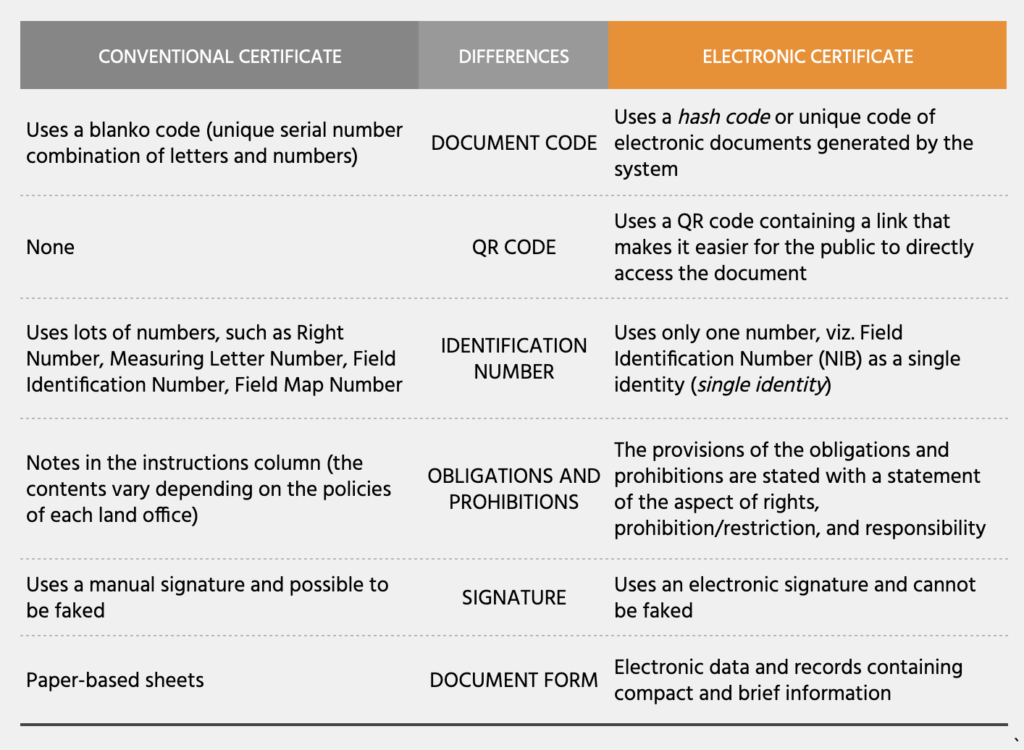The Ministry of Agrarian Affairs and Spatial Planning (ATR)/ National Land Agency (BPN) or Kementerian Agraria dan Tata Ruang /Badan Pertanahan Nasional (“ATR/BPN”) has issued new regulations regarding electronic land certificates.
Starting in 2021, ATR/BPN will begin to use electronic land certificates as stipulated in the Regulation of the Minister of ATR/Head of BPN Number 1 of 2021 concerning Electronic Certificates which was signed on January 12, 2021. This means that proof of ownership of a land certificate or land book will no longer be made of paper, but rather an electronic land certificate whose data is included in the land system.
“Through this regulation, the implementation of land registration that was previously carried out conventionally can be carried out electronically, both for the first-time land registration and data maintenance”, said the Minister of ATR/Head of BPN, Sofyan Djalil.
Through this program, the government is trying to automate land data management and make it transparent. It includes transformations, maintenance, and updating of maps, survey, and registration of land, land service improvement reform, infrastructure improvement especially related to land data, increasing the credibility of the ATR/BPN, and realize the modernization of land services to improve public services to the community by simplifying the bureaucracy in land certification through advances in digital information technology. This digitalization also could prevent the issuance of multiple certificates which can minimize the scope of land disputes and could prevent the collusion and corruption practices in land certification. This program would provide clear titles of land ownership that could be monitored easily by ATR/BPN, facilitate quicker transactions, and reduce disputes. Most importantly it would reduce construction timelines and overall cost for the developer, the benefits of which can be transferred to the consumer making property prices more attractive and can broadly increase our economy.
As for some of the advantages of this electronic certificate, among others, 1) the land data becomes more accessible to all; 2) to check land frauds and illegal possessions; 3) the community does not need to panic if the land certificate is lost, because the land certificates are stored electronically, and can be accessed and downloaded through the application Sentuh Tanahku; 4) the land certificates can be printed yourself; 5) the land document management is more practical and easier. Moreover, the electronic certificate will not reduce the land price value if used as collateral for bank financing.
ATR/BPN is preparing few elaborate steps for implementation of the Electronic Certificates and it will be carried out in stages. The outcome of this exercise would be the Electronic Certificates. They will be in the form of electronic data, information, and/or electronic documents, which contain data of the rights holders, physical data, and juridical data on the land along with its validity and authentication. All the data would be stored in the electronic system database.
The implementation of an electronic land registration includes the collection, processing, and data presentation, which will result in the form of electronic documents of a land certificate. The electronic certificates will be ratified using electronic signs according to the related law and regulations.
The change from conventional land certificates to electronic certificates is carried out through a request for land registration data maintenance service. This change can also be done if the physical data and juridical data in the land book and certificate are correct as per the physical data and juridical data in the electronic system.
There are 6 (six) differences between conventional and electronic certificates, as follows:

Some of the challenges in this program that we can mention, among others are the transparency of system and database setup to prevent collusion and corruption practices, and education to the community to switch the habit of physically storing essential documents to electronic documentation. Therefore, considering how important this program is, we support and will always provide the latest information on law and regulations, specifically in the areas of land regulations, as part of our contribution to educating our clients and the community as well.
________________
Author: Dewi Susanti
Source: Ministry of Agrarian Affairs and Spatial Planning/National Land Agency